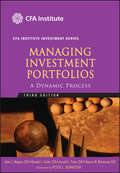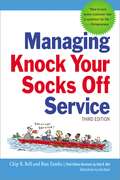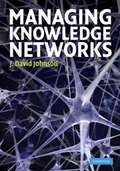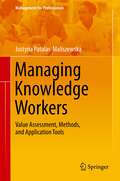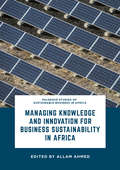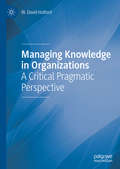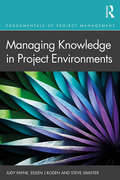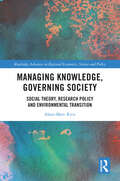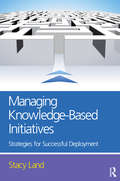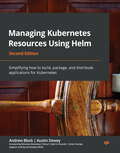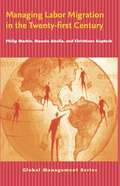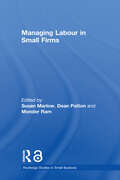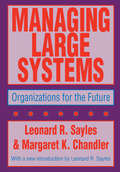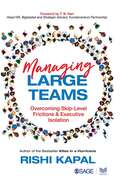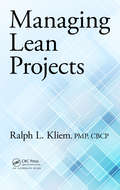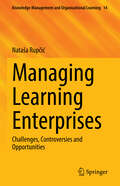- Table View
- List View
Managing Interpersonal Feedback
by Louis B. BarnesProvides a discussion of both the importance and some possible pitfalls that may be encountered when one tries to talk candidly with others about their behavior on the job.
Managing Investment Portfolios
by Donald L. Maginn Cfa John L. Tuttle Cfa Mcleavey Cfa Dennis W. Pinto Cfa Jerald E."A rare blend of a well-organized, comprehensive guide to portfolio management and a deep, cutting-edge treatment of the key topics by distinguished authors who have all practiced what they preach. The subtitle, A Dynamic Process, points to the fresh, modern ideas that sparkle throughout this new edition. Just reading Peter Bernstein's thoughtful Foreword can move you forward in your thinking about this critical subject. " -Martin L. Leibowitz, Morgan Stanley "Managing Investment Portfolios remains the definitive volume in explaining investment management as a process, providing organization and structure to a complex, multipart set of concepts and procedures. Anyone involved in the management of portfolios will benefit from a careful reading of this new edition. " -Charles P. Jones, CFA, Edwin Gill Professor of Finance, College of Management, North Carolina State University
Managing IoT Systems for Institutions and Cities (Internal Audit and IT Audit)
by Chuck BensonThis book defines what IoT Systems manageability looks like and what the associated resources and costs are of that manageability. It identifies IoT Systems performance expectations and addresses the difficult challenges of determining actual costs of IoT Systems implementation, operation, and management across multiple institutional organizations. It details the unique challenges that cities and institutions have in implementing and operating IoT Systems.
Managing Joint Innovation
by Francis BidaultJoint innovation between different organizations or groups has become a common practice for the many companies confronted with major shifts in customers' demand and new technological possibilities. These co-development alliances, however, are typically unstable, and regularly result in drastic restructuring as the partners learn to work together and confront unexpected difficulties. This new and innovative book takes a fresh look at the critical task of managing relationships and communication in co-development alliances. Good relational quality management will certainly not compensate for bad business strategies and poor execution of initiatives. But, at the same time, outstanding relationships will not survive when there is a lack of trust between partners and a desire for tighter control over one another. Francis Bidault presents a new framework for understanding the dynamics of alliances and for managing the relationship between partners at all levels, with practical tools to help successfully develop joint innovation initiatives.
Managing Knock Your Socks Off Service (Knock Your Socks Off Ser.)
by Ron Zemke Chip R. Bell John BushIn our increasingly connected world, customer service can make or break a business. Companies that excel keep customers coming back--and those who don't soon discover that word spreads fast. The difference is in how managers train, coach, and support frontline employees. Extensively revised with today's empowered, web-savvy consumer in mind, Managing Knock Your Socks Off Service shows managers and supervisors how to: * Find and retain service-oriented people * Understand customer needs, expectations and desires * Build a service vision * Design a user-friendly service delivery process * Involve and inspire employees * Recognize and reward good performance. The third edition features new chapters on: learning from lost customers; inciting passion and incentivizing service; fostering trust; and delivering great customer experiences online. In short, everything readers need to ensure their frontline employees become their company's biggest asset.
Managing Knowledge Networks
by J. David JohnsonThe information context of the modern organization is rapidly evolving in the face of intense global competition. Information technologies, including databases, new telecommunications systems, and software for synthesizing information, make a vast array of information available to an ever expanding number of organizational members. Management's exclusive control over knowledge is steadily declining, in part because of the downsizing of organizations and the decline of the number of layers in an organizational hierarchy. These trends, as well as issues surrounding the Web 2.0 and social networking, mean that it is increasingly important that we understand how informal knowledge networks impact the generation, capturing, storing, dissemination, and application of knowledge. This innovative book provides a thorough analysis of knowledge networks, focusing on how relationships contribute to the creation of knowledge, its distribution within organizations, how it is diffused and transferred, and how people find it and share it collaboratively.
Managing Knowledge Workers
by Justyna Patalas-MaliszewskaThis book focuses on understanding the strategic role of the knowledge workers in companies, especially in creating an innovative company. The author presents the 'Sknowinnov method' and a decision-making model for the assessment of the value of strategic knowledge resources in companies. This method and its approach can be used as excellent tools for a quantitative knowledge analysis in an economic viewpoint. The IT tool that is developed for this method offers support in decision making at a strategic level regarding the profitability of any investment in employee qualifications and skills. The tool also connects the selected determinants described in an innovative company with the value of the personnel usefulness function, enabling the assessment of the rationality and effectiveness of knowledge. HR managers and knowledge management consultants for innovative companies would find this book and the IT tools presented specially useful. This book also adds value to researchers dealing with analysis of quantitative and qualitative methods in intellectual capital research.
Managing Knowledge Workers
by Thomas H. DavenportHow should knowledge workers be managed in order to extract the highest possible level of performance and results? How should a manager act within a knowledge intensive organization? This chapter argues that the growth of knowledge work is the single most important factor driving the future of management, and focuses on a set of management attributes that are at the core of knowledge work. This chapter is excerpted from "Thinking for a Living: How to Get Better Performance and Results from Knowledge Workers."
Managing Knowledge and Innovation for Business Sustainability in Africa (Palgrave Studies of Sustainable Business in Africa)
by Allam AhmedAddressing the issues that will be central to Africa’s various attempts to effectively manage knowledge and innovation for sustainable business management, this edited book makes a timely contribution to research on business in Africa. Coinciding with the recently launched Science, Technology and Innovation Strategy for Africa 2024 (STISA-2024) by the African Union (AU), which emphasises the critical role of science, technology and innovation for Africa’s socio-economic development and growth, the book echoes these themes with a multi-disciplinary and multi-sectoral approach to knowledge and innovation management in Africa. Also containing case studies relating to various growing collaborations between education and research institutions, private and public entities as well as commercialisation of research and innovation outputs, Managing Knowledge and Innovation for Business Sustainability in Africa covers the key themes to provide an enabling environment for STI development in the African content.
Managing Knowledge and Learning at NASA and the Jet Propulsion Laboratory (JPL)
by Dorothy Leonard David KironJet Propulsion Laboratory (JPL) faces a serious loss of knowledge--both because of the "faster, better, cheaper" mandate for Mars missions and from the retirement of key personnel. An extensive knowledge management system for NASA/JPL includes formal knowledge-capture mechanisms such as Web pages and digitized manuals and such informal ones as storytelling. The former are much easier to get funded and to implement than the latter, but chief knowledge architect Jeanne Holm is concerned that technology cannot solve some of the most difficult issues she faces. This case focuses more on managing the tacit knowledge held in the heads of scientists and experienced project managers than on the information technology that Holm has put in place. The switch from expensive but infrequent Mars missions to 2 missions every 26 months propelled a number of junior managers into positions of responsibility and decision making for which they had inadequate experience. In the face of increasingly tight budgets, Holm must decide what kinds of knowledge management initiatives to back--and how to encourage the cultural change that is needed in the organization.
Managing Knowledge in Organizations: A Critical Pragmatic Perspective
by W. David HolfordThis book explores organizational knowledge and how it can be pragmatically exploited within many of today’s socio-technical-economic contexts. It provides both conceptual and empirical findings across different organizational contexts, addressing areas which have either been under-developed, such as power in relationship to knowledge, or require further examination, such as the role a more holistic, action-oriented view can contribute towards identifying and retaining expert knowledge within an organization, especially within digital environments. Further, it looks at how different perceptions, mental models, beliefs, and emotions (or lack of), as well as differing actions and behaviors, affect our abilities to detect hidden risks. This book will guide researchers in rendering the relationship between the managing of knowledge and the presence of risk more visible.
Managing Knowledge in Project Environments (Fundamentals of Project Management)
by Judy Payne Eileen Roden Steve SimisterManaging Knowledge in Project Environments illustrates how knowledge management (KM) contributes to successful project work. KM is widely practised in project environments, but managers don’t always recognise the knowledge aspects of their work and tend to treat KM as a series of specific activities rather than a way of making project work produce better outcomes in different contexts. To overcome this challenge, the authors present KM as an integral part of project work and explain it using principles: KM fundamentals that apply anywhere. A series of context factors provides readers with a framework for understanding and thinking about what KM means for their context: their goals, their projects, their organisations and their working environments. Hidden KM is exposed, myths are debunked and practical guidance explains how to build KM into projects and portfolios. The approach is consistent with current guidance including the BS ISO management systems standard for KM and the seventh edition of APM’s ‘Body of knowledge’. The aim is to help project professionals, sponsors, PMO members and others who can make a difference manage knowledge more effectively in project environments. Managing Knowledge in Project Environments offers everyone involved in project work a definitive short guide to the subject.
Managing Knowledge in the Construction Industry (Spon Research)
by Alexander StyhreKnowledge management presents a new way of understanding organizations and companies, and is especially suited to sophisticated and highly technical firms and operations such as those in the construction industry. This new book draws on hard data from three separate research programs in Sweden and shows how the concept of knowledge can make sense in the construction industry, an industry which can be viewed in essence as being engaged in the material transformation of "nature into buildings". In particular it explores and examines three different businesses: a medium sized construction firm; Wingårdh Architecture, Sweden’s most prestigious architecture firm; and BESAB, a specialist concrete injection firm working on underground construction. An emerging theme is the situational and context-bound nature of knowledge in the construction industry, thus showing "knowledge" to be a remarkably heterogeneous concept. A range of readers should find the book useful, from students and construction managers through to researchers.
Managing Knowledge, Governing Society: Social Theory, Research Policy and Environmental Transition (Routledge Advances in Regional Economics, Science and Policy)
by Alain-Marc RieuSince the 1980s, two different paradigms have reshaped industrial societies: the Neoliberal paradigm and a Research and Innovation paradigm. Both have been conceptualized and translated into strong policies with massive economic and social consequences. They provide divergent responses to the environmental transition. The Neoliberal paradigm is based on economic models and geopolitical solutions. The Research and Innovation paradigm’s goal is to manage knowledge differently in order to reorient the evolution of society. Since the mid-1990s, a version of the Research and Innovation paradigm has led to the design of large-scale research and innovation policies. This book examines how these policies have evolved and how they can be extended and reformed to respond to present and future environmental constraints. It studies the mutation of the conception, organization and role of science and technology in the evolution of industrial societies and explores the future of these developments. The book offers three unique lines of enquiry. The first is to focus not specifically on economics, sociology, political science or history, but on knowledge creation from an institutional and reflexive point of view. The second is to establish a convergence between the British school of science and technology studies and the research trends opened by the work of Michel Foucault. Both introduced trans-disciplinary and policy-oriented research associating case studies, long-term perspectives and theory. The third is to consider climate change as the overwhelming challenge of our time. The book is an insightful guide for students, scholars and researchers across the humanities and social sciences, including philosophy, political science, law, economics, business and media.
Managing Knowledge-Based Initiatives
by Stacy LandManaging Knowledge-Based Initiatives from Pilot to Enterprise Deployment shows practitioners how to take their successful knowledge management pilot programs and to successfully expand them throughout the organization. Keeping the unique challenges of knowledge-based work in mind, Stacy Land explores what knowledge managers/project managers must know to effectively navigate within their organizations, position their work in a value-based framework, and publicize their work to increase buy-in. Topics include avoiding common sand traps, working with committees and multiple departments, compliance, entering a new world of politics and funding, achieving organizational alignment, developing and executing on a value proposition, negotiating executive sponsorship, and more.
Managing Kubernetes Resources Using Helm: Simplifying how to build, package, and distribute applications for Kubernetes, 2nd Edition
by Andrew Block Austin Dewey Rimantas Mocevicius “rimusz”Reduce the complexity of managing applications on Kubernetes and develop an enterprise pattern for application deliveryKey FeaturesLearn best practices from the core maintainer of Helm for application delivery and life cycle managementManage applications deployed in Kubernetes effectively using HelmGo beyond the basics when using Helm with key security considerations and management optionsBook DescriptionContainerization is one of the best ways to implement DevOps, and learning how to execute it effectively is an essential part of a developer's skillset. Kubernetes is the current industry standard for container orchestration. This book will help you discover the efficiency of managing applications running on Kubernetes with Helm. Starting with a brief introduction to Helm and its impact on users working with containers and Kubernetes, you'll delve into the primitives of Helm charts and their architecture and use cases. From there, you'll understand how to write Helm charts in order to automate application deployment on Kubernetes and work your way toward more advanced strategies. These enterprise-ready patterns are focused on concepts beyond the basics so that you can use Helm optimally, looking at topics related to automation, application development, delivery, lifecycle management, and security. By the end of this book, you'll have learned how to leverage Helm to build, deploy, and manage applications on Kubernetes.What you will learnUnderstand how to deploy applications on Kubernetes with easePackage dynamic applications for deployment on KubernetesIntegrate Helm into an existing software release processDevelop an enterprise automation strategy on Kubernetes using HelmUse Helm within a Helm Kubernetes operatorLeverage Helm in a secure and stable manner that fits the enterpriseDiscover the ins and outs of automation with HelmWho this book is forThis book is for Kubernetes developers or administrators who are interested in learning Helm to provide automation for app development on Kubernetes. Although no prior knowledge of Helm is required, basic knowledge of Kubernetes application development will be useful.
Managing Labor Migration in the Twenty-first Century
by Philip Martin Manolo Abella Christiane KuptschWhy have ninety million workers around the globe left their homes for employment in other countries? What can be done to ensure that international labor migration is a force for global betterment? This groundbreaking book presents the most comprehensive analysis of the causes and effects of labor migration available, and it recommends sensible, sustainable migration policies that are fair to migrants and to the countries that open their doors to them. The authors survey recent trends in international migration for employment and demonstrate that the flow of authorized and illegal workers over borders presents a formidable challenge in countries and regions throughout the world. They note that not all migration is from undeveloped to developed countries and discuss the murky relations between immigration policies and politics. The book concludes with specific recommendations for justly managing the world's growing migrant workforce.
Managing Labour in Small Firms (Routledge Studies in Entrepreneurship and Small Business)
by Susan Marlow Dean Patton Monder RamThe majority of employees currently working in the private sector are now employed in small firms, yet little is known about their working conditions. This collection of essays addresses this gap. Based on theoretical analysis supported by contemporary empirical evidence, the book explores key areas of the employment relationship adding a new perspective to our understanding of contemporary work.
Managing Labour in Small Firms (Routledge Studies in Small Business #Vol. 9)
by Susan Marlow Dean Patton Monder RamThe majority of employees currently working in the private sector are now employed in small firms, yet little is known about their working conditions. This collection of essays addresses this gap. Based on theoretical analysis supported by contemporary empirical evidence, the book explores key areas of the employment relationship adding a new perspective to our understanding of contemporary work.
Managing Large Systems: Organizations for the Future
by Leonard R. SaylesManaging Large Systems examines a range of human, organizational, and managerial challenges associated with large systems. Special attention is given to the behavioral relationships among scientists and engineers, business and technical managers, sponsor organizations and their contractors, business and government officials, and line and functional managers.The descriptions of problems of technical organization and performance motivation are based primarily on an extended field study of the National Aeronautics and Space Administration. Managing Large Systems includes a description of the unique management system developed by NASA under the leadership of James Webb that many believe was responsible for their extraordinary technological achievements that culminated in the first moon landing. Parallels are drawn to other large-scale technology programs in aerospace and atomic energy.The authors find traditional managerial principles regarding controls, incentive systems, and planning to be inadequate in the context of large systems. They look to organizational clusters to manage future projects in advanced technological areas and in public sectors such as urban development, massive medical programs, and ecological improvements.
Managing Large Teams: Overcoming Skip- Level Frictions & Executive Isolation
by Rishi KapalManaging and leading large teams is an acquired skill and doesn’t come naturally to people. As the team grows horizontally in number and vertically in levels, team management gets complicated. Managing Large Teams is borne out of the author’s twenty-five plus years of experience of navigating multiple scenarios, transitioning from an individual contributor to becoming a first-time manager to later helming teams as a CXO that expanded across North America, Europe, Japan and Southeast Asia. Brimming with the wisdom and experiences of Indian and global CXOs, and Stanford LEAD alumni, the book tackles subjects such as handling multicultural and multi-locational teams, building a strong trustworthy culture of skip-level engagements and the oft-discussed phenomenon of executive isolation at work. Get your hands on this reservoir of knowledge on leadership, organization development and management practices for the present and future generations of performers.
Managing Leadership Paradoxes
by Lotte S. LuscherManagers today are faced with numerous complex challenges speckled with paradoxes. They must have a sharp economical focus while simultaneously engaging in creative and innovative thinking. They must support individuals as well as teams, think globally, and do business locally. This book views complexity as a fundamental element of leadership, rather than something that should simply be reduced and removed. It presents a leadership concept that includes both sides of the paradox. <P><P>Managing Leadership Paradoxes uses case studies and practical exercises to show how managers can maintain decisiveness in the face of paradoxes, complexities, and contradictory demands. Lotte Lüscher draws on research gleaned from managers within the international corporation, Lego, to provide first-hand knowledge of how a large-scale organization meets and manages change paradoxes, rather than treating them as something that needs to be reduced and removed. It will assist managers and aspiring managers in expanding their understanding of leadership challenges beyond dilemmas, and equip them with the managerial skills to handle the most persistent and pervasive paradoxical challenges that arise as a result of organizational change. <P><P>The book will be of interest to leaders and managers, as well as students of leadership, management and organizational studies.The intent is to provide the reader with a foundation for reflecting on his or her own leadership practice with special focus on organizational complexity, ambiguity, and paradoxes.
Managing Lean Projects
by Ralph L. KliemLean is a set of disciplines that can result in tremendous savings and profitability for companies. It can significantly reduce cycle times and increase customer satisfaction. Lean, however, must be applied efficiently and effectively to achieve optimum results. This book discusses project management concepts, tools, and techniques as they apply to
Managing Learning Enterprises: Challenges, Controversies and Opportunities (Knowledge Management and Organizational Learning #14)
by Nataša RupčićThis book provides an overview and a critical analysis of prior research and practice insights in the field of learning organizations and learning enterprises. However, it also represents the author's own findings and reflections on various dimensions and perspectives of a learning organization, offering solutions in response to previous findings and their critical evaluation. It reflects the time in which it was written, characterized by concerns about reaching the limits of growth and the potential collapse of the world under the burden of pollution and a growing population. Instead of advocating for greater control and regulation, this book presents a different perspective on the solution: the development and transformation of collective consciousness.
Managing Lease Portfolios
by Townsend WalkerLeasing is one of today's more complex forms of financing, and, unless you have extensive experience in this arena, making informed decisions can be difficult. Over the life of a lease, its risks and returns change, and the factors that affect the risks and returns also change.In Managing Lease Portfolios, Townsend Walker, an expert in this field, explains how to evaluate the risk of lease portfolios as well as hedge their long-term, non-traded risks. Here, you'll learn how to apply various financial tools to your portfolio of leases and discover the work that goes into each step--such as measuring the risks of a lease, calculating the returns, and estimating the effects of diversification. Many of the ideas and concepts found within this comprehensive resource have existed for a number of years in the fields of foreign exchange, interest rate and credit derivatives, and the bond and stock markets. This book adapts and applies these concepts to managing leases. Then it illustrates how you can implement these new concepts through concrete models that have been proven to work in the real world.

